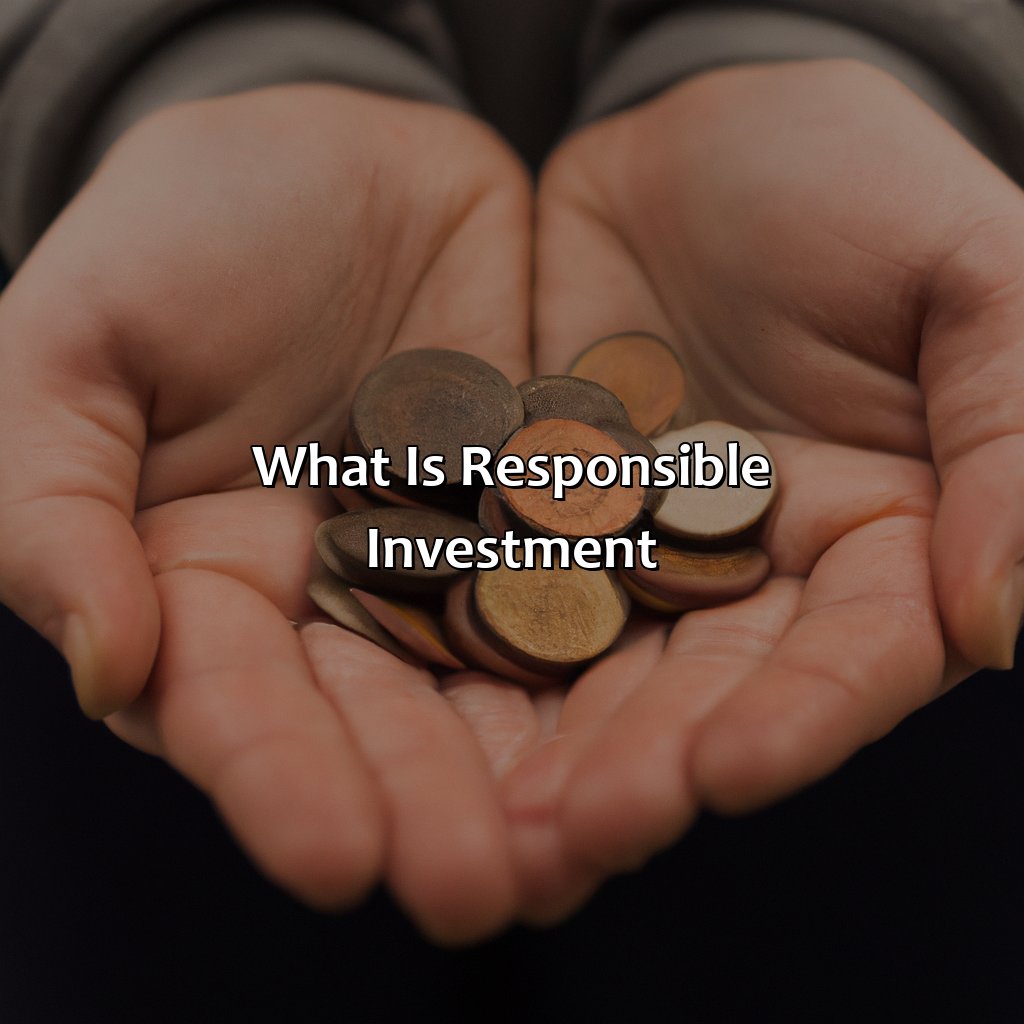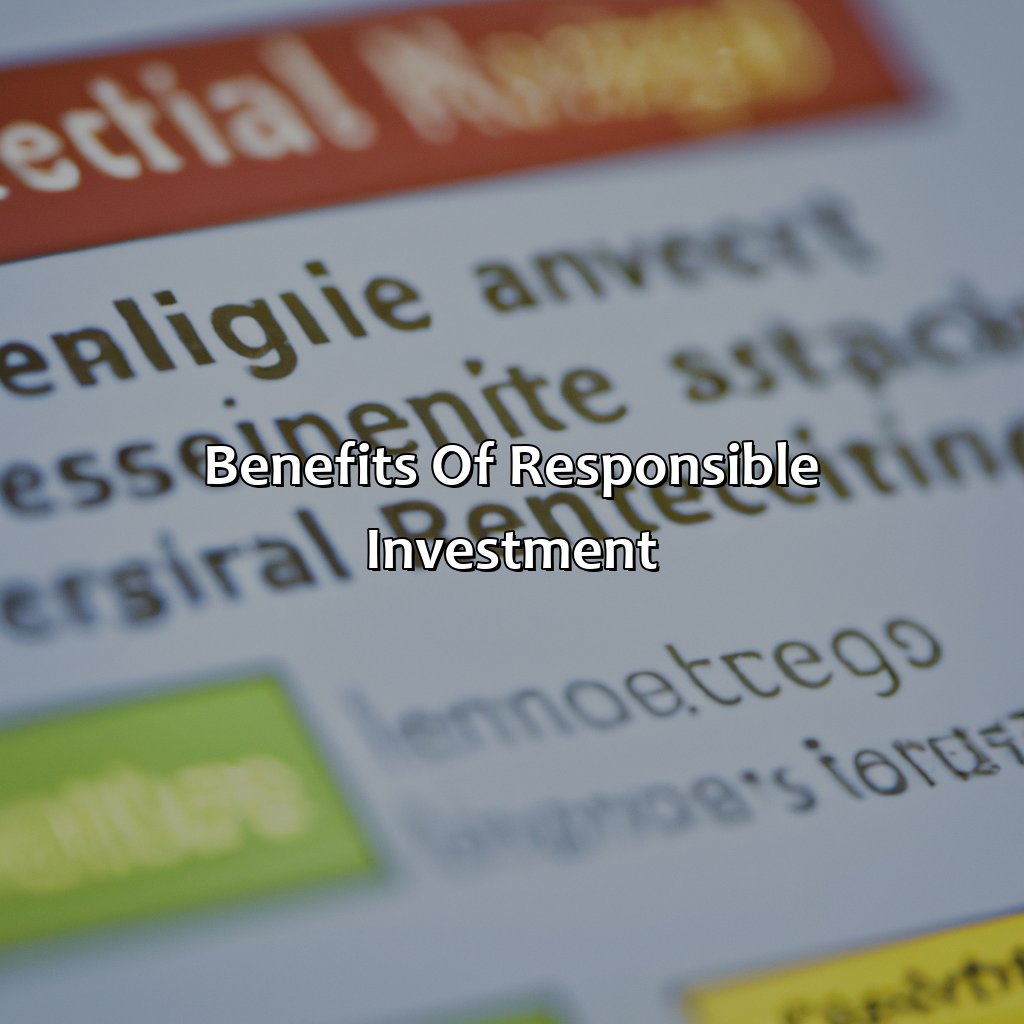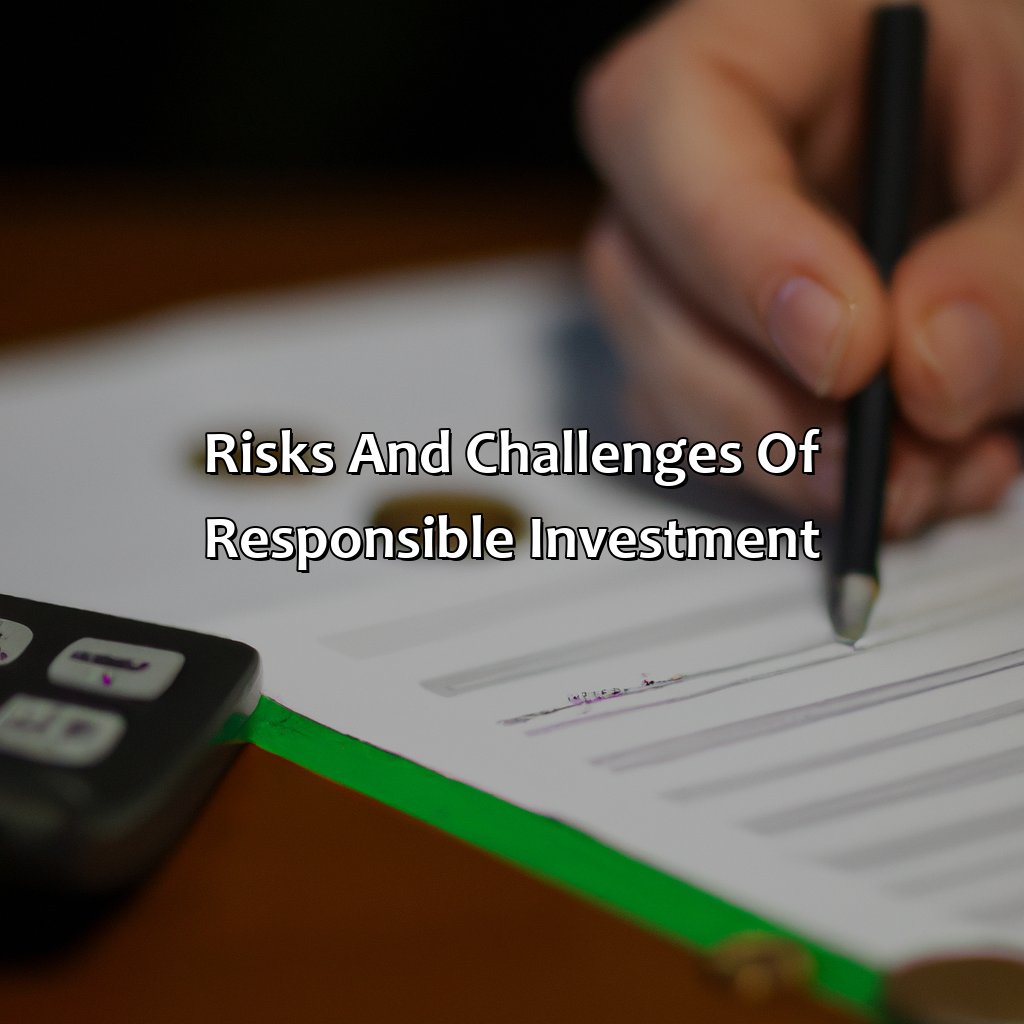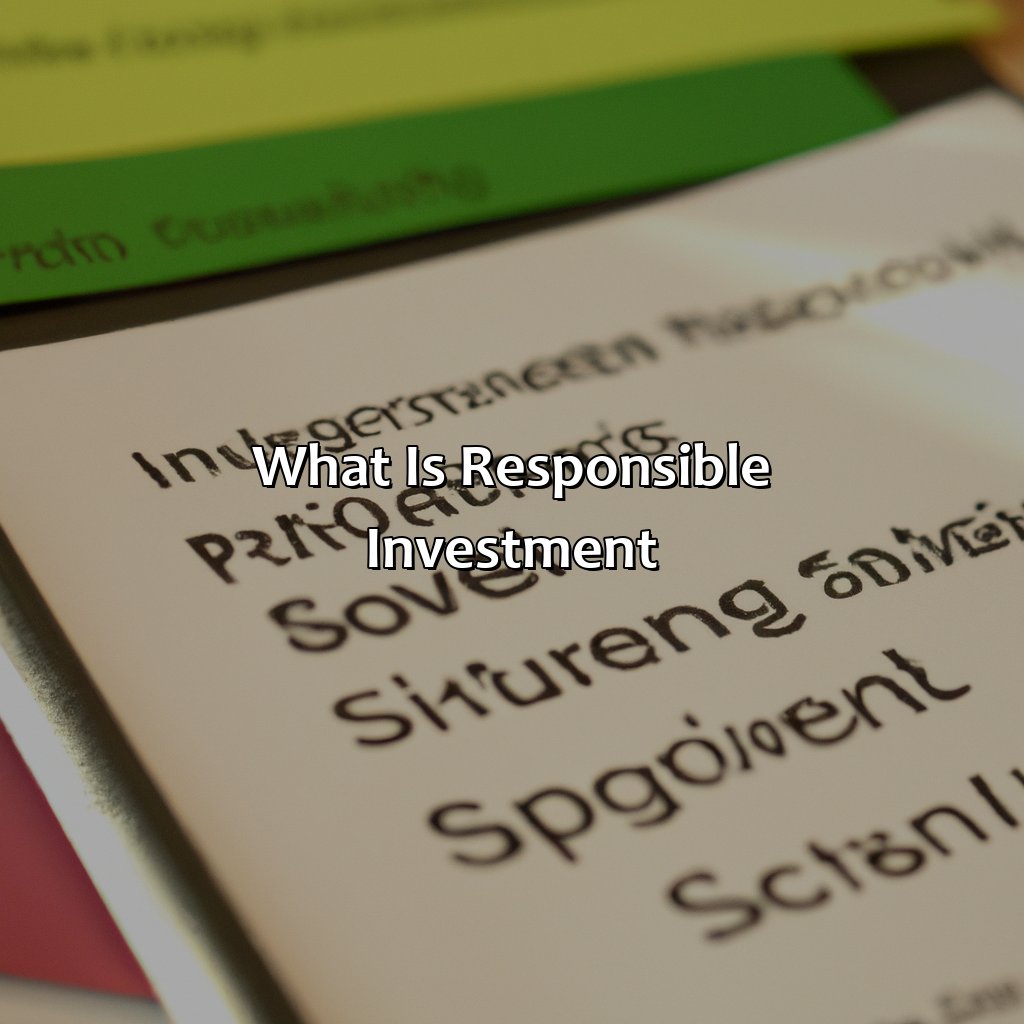What Is Responsible Investment?
Key Takeaway:
- Responsible investment refers to investment strategies that consider environmental, social, and governance (ESG) factors in addition to financial returns. This approach aims to promote sustainable and ethical practices by companies and organizations.
- Examples of responsible investment strategies include impact investing, which focuses on generating measurable social or environmental benefits alongside financial returns, and ESG integration, which involves incorporating ESG factors into traditional financial analysis to assess risk and opportunity.
- The benefits of responsible investment include reducing risk and volatility, improving long-term financial performance, supporting sustainable and ethical practices, and contributing to positive social and environmental outcomes.
Are you curious about the concept of responsible investing? It is an important topic that can help you to make informed decisions when investing your money. You’ll learn what responsible investing involves and the potential benefits it brings.
What is responsible investment?
Want to comprehend responsible investment? This section will help! It means investing in a way that creates financial gain and helps society and the environment. Here, you’ll find the definition and examples of responsible investment strategies.

Image credits: retiregenz.com by Yuval Arnold
Definition of responsible investment
Responsible investing is an investment approach that incorporates environmental, social and governance (ESG) principles with financial analysis to identify companies that meet both financial and ethical standards. Investors who practice responsible investing aim to achieve long-term returns while ensuring the preservation of natural resources and minimizing negative impacts on society.
Responsible investing considers a company’s actions towards its stakeholders, including employees, customers, suppliers, and local communities. It also evaluates its impact on the environment and society as well as its corporate governance structure. By choosing companies that demonstrate a commitment to ESG principles, investors incentivize them to maintain sustainable practices and make positive contributions to their stakeholders.
Moreover, responsible investing involves engaging in dialogue with companies to encourage better ESG practices or divestment if necessary. Through active ownership and engagement with portfolio companies, investors can effectively drive positive change.
To participate in responsible investing, investors can consider using ESG screening techniques which evaluate a company’s performance in key areas such as carbon footprint, labor practices, human rights record or board diversity. Alternatively, they could invest in ESG-themed funds which focus on specific sustainability challenges or opportunities.
Investing responsibly is like a game of chess – you have to consider all the possible moves before making your next move.
Examples of responsible investment strategies
Responsible investing refers to strategies that aim to generate financial returns while also considering social and environmental impacts. An example of such a strategy includes investing in companies with strong environmental, social and governance (ESG) practices. Another approach is impact investing, where investors allocate capital to projects that generate positive social or environmental outcomes alongside financial returns.
Other responsible investment strategies include shareholder engagement, which means using voting rights and engaging in dialogues with companies on ESG issues, and exclusionary screening, which involves avoiding investment in companies involved in controversial sectors or activities deemed harmful to society or the environment.
It’s worth noting that responsible investment strategies can differ significantly depending on the investor’s objectives and beliefs. Some may prioritize climate change action while others may focus on promoting responsible governance practices.
A recent study by Morningstar found that sustainable funds attracted a record $71 billion in global inflows during Q1 2021, marking the strongest start to any year for sustainable funds on record.
Responsible investment: Because making money and saving the world can actually go hand in hand.
Benefits of responsible investment
Gain insight into the advantages of responsible investment! It brings environmental, social, and financial benefits. Introduce responsible investment strategies to gain returns in all three of these areas. Each has its own distinct effect. Realize the environmental, social, and financial rewards of responsible investment.

Image credits: retiregenz.com by Harry Woodhock
Environmental benefits
Investing responsibly not only benefits the investors but also has a significant impact on the environment. Sustainable and eco-friendly investment practices can lead to reduced greenhouse gas emissions, efficient use of natural resources, and protection of biodiversity.
Reducing carbon footprint and promoting renewable energy sources are key factors in responsible investment that contribute to environmental benefits. Investing in companies with low carbon emissions and supporting those that are transitioning towards sustainable energy production helps mitigate the effects of climate change. Furthermore, investing in water conservation companies can help protect water supplies and promote more efficient usage.
Another vital aspect of responsible investing is supporting companies that embrace green initiatives such as waste management, recycling, sustainable agriculture, and forest conservation. These initiatives go beyond minimizing environmental harm caused by business activities by supporting rejuvenation efforts to restore ecological systems.
By embracing responsible investment practices that prioritize environmental sustainability over short-term gains, investors have an opportunity to participate in positively impacting the planet while optimizing their portfolio’s performance. As an investor committing to responsible investing, you can be a force for good and contribute to a healthier planet while securing long-term returns for yourself.
Investing responsibly not only makes you feel good, but also makes you look good on social media – talk about a win-win situation.
Social benefits
Responsible investment has numerous societal benefits, chiefly in promoting sustainable business practices, fostering social welfare, and improving labor standards. A responsible investment approach can mitigate risks stemming from environmental damages or human rights violations while ensuring corporations respect diverse communities’ interests. Additionally, responsible investing helps develop robust governance structures that can prevent market instability due to unethical behavior by corporations and increase investor confidence in the market. Moreover, it encourages ethical conduct and innovativeness within companies by aligning their goals with the broader society’s expectations.
It’s worth noting that responsible investing is swiftly gaining momentum globally as investors shift towards sustainability-oriented investments. According to a report published by Morningstar in 2020, such investments saw inflows of over $70 billion in the first six months of the year despite the economic downturn caused by the pandemic. This highlights investors’ growing recognition of the critical role financial markets play in achieving sustainable development goals while earning competitive returns.
Responsible investing may not guarantee you a yacht, but it will help you sleep well at night knowing your money isn’t supporting sweatshops and puppy mills.
Financial benefits
Investing responsibly can bring numerous financial benefits. Here are some examples:
- Favorable Returns: Responsible investment supports companies that strive for long-term sustainability, which typically results in stable returns.
- Risk Mitigation: Investing in socially conscious firms reduces the risk of being associated with entities that operate unethically and face legal or reputational hazards.
- Cost Reduction: Companies with robust environmental, social, and governance (ESG) policies attract customers and employees who value responsible corporate behavior, reducing recruitment, retention and marketing costs.
Additionally, responsible investment fosters a positive societal impact by ensuring that the investments are directed towards companies that prioritize community well-being. To maximize these benefits, consider investing in mutual funds or exchange-traded funds (ETFs) that incorporate ESG criteria into their selection process.
To enhance profitability further, evaluate investments using objective criteria such as social costs or environmental effects. Assigning values to aspects such as carbon impact may enable potential growth opportunities while providing increased transparency for investors regarding company practices.
Responsible investment can be risky, but hey, isn’t living on the edge a part of being a responsible adult?
Risks and challenges of responsible investment
Gaining insight into responsible investment for sustainable development? Unravel the three sub-sections! Lack of standardization, limited investment options, and difficulty in measuring impact. Each challenge is a barrier. To meet their sustainability objectives, responsible investors must overcome them all.

Image credits: retiregenz.com by James Arnold
Lack of standardization
The absence of a universal standard for responsible investment poses a major challenge. It causes ambiguity and makes it difficult to accurately comprehend the different types of responsible investment. Various factors, including industry-specific core issues, as well as differences in regulatory requirements across regions, make it difficult to establish a common framework. These differences underscore the need for frameworks that accurately capture and help measure performance around social and environmental objectives.
Recent research from ESG Report Quarterly indicated that an estimated 92% of asset managers consider Responsible Investing (RI) important for their business. Therefore, institutions must address the issue of lack of standardization by establishing clear guidelines and metrics for evaluating its effectiveness and reinforcing trust among investors.
Looks like my investment options are more limited than my dating options – at least I don’t have to worry about responsible dating.
Limited investment options
Investors face limitations in their investment options due to the nature of responsible investing. The screening process of companies for environmental, social and governance (ESG) criteria reduces the pool of eligible investments.
Furthermore, many responsible investment funds may focus on specific themes or industries, further narrowing down the available options for investors seeking diversification.
However, this limitation can also be seen as an opportunity for investors to focus on high-impact ESG investments that align with their values and long-term goals. Research shows that responsible investing can be financially rewarding while promoting positive change.
To overcome limited investment options, investors can consider alternative assets such as private equity or real estate, which often have higher ESG standards than publicly traded companies. They can also explore socially responsible mutual funds or exchange-traded funds (ETFs) that provide exposure to diversified portfolios of sustainable companies.
Overall, while limited investment options present a challenge for responsible investors seeking portfolio diversification, it is an opportunity to make a positive impact while achieving financial returns.
“Measuring the impact of responsible investment is like trying to count the number of grains of sand on a beach during a hurricane.”
Difficulty in measuring impact
When assessing the impact of responsible investment, it can be challenging to measure outcomes accurately. Evaluating the results of sustainable investment goes beyond assessing financial performance and requires an analysis of ESG (environmental, social, and governance) factors. Investors face complications in evaluating how companies apply ESG principles and translating those factors into tangible outcomes.
Measuring social and environmental impacts is particularly challenging because they are often intangible, complex, or long-term. Furthermore, impact measurement standards and methodologies vary across the sustainability industry, which can lead to inconsistent evaluations.
Despite these challenges, numerous methods exist for measuring the success of responsible investment. For instance, some investors use stakeholder engagement initiatives that cultivate relationships with stakeholders like suppliers and employees to evaluate the company’s level of responsibility. Others might utilize data portals that collate ESG metrics into ratings frameworks for easy comparison between companies.
Historically investing was focused solely on generating profits by picking successful businesses or technologies. However, in the 1970s social conscience came into play when people began divesting from companies at the forefront of the military-industrial complex, instead focusing on outcomes such as ethics and environmental responsibility. This showed that people realized that they had a choice to influence corporate behavior by withholding capital from corporations whose values were not aligned with theirs. Nevertheless, aligning values with investments has always been a challenging task until recent advancements in sustainable finance made it seem more practical than ever before.
##Example Response:
Some Facts About Responsible Investment:
- ✅ Responsible investment involves considering environmental, social and governance (ESG) factors in investment decisions, alongside financial factors. (Source: UNPRI)
- ✅ The size of the responsible investment market has increased dramatically in recent years, reaching $31 trillion globally in 2020. (Source: Global Sustainable Investment Alliance)
- ✅ A growing number of investors are reporting that ESG considerations have a positive impact on financial returns. (Source: Harvard Business Review)
- ✅ Many responsible investment strategies are based on the United Nations’ Sustainable Development Goals (SDGs), which provide a framework for achieving sustainable development. (Source: SDG Compass)
- ✅ Responsible investment can benefit society and the environment, as well as providing financial returns for investors. (Source: PRI)
FAQs about What Is Responsible Investment?
What is responsible investment?
Responsible investment refers to an investment approach that takes into account environmental, social, and governance (ESG) factors in addition to traditional financial criteria. The aim is to generate long-term value while minimizing negative impacts and promoting positive ones.
Why is responsible investment important?
Responsible investment is important because it can help drive positive change in companies and industries. It can also help mitigate risks and improve long-term financial returns. Additionally, it can improve transparency and accountability, promoting greater trust and confidence in the financial system.
How do investors approach responsible investment?
Investors approach responsible investment in a variety of ways, depending on their goals, values, and objectives. Some may adopt exclusionary strategies that avoid certain industries or activities, while others may take an active ownership approach that engages with companies to encourage positive change. Still, others may seek out investments that have a positive impact on the environment or society.
What are some examples of responsible investment?
Examples of responsible investment can include investing in companies that have strong records on diversity and inclusion, environmental sustainability, or human rights. It can also involve investing in renewable energy or clean technology, or supporting companies that have a positive impact on local communities or marginalized groups.
How can investors evaluate the responsible investment practices of a company?
Investors can evaluate the responsible investment practices of a company by conducting research, using ESG ratings and analysis, and engaging with the company directly. They can also look at the company’s public disclosures and reports to gain a better understanding of its practices and policies.
What are the benefits of responsible investment?
The benefits of responsible investment can include improved long-term financial returns, reduced risks, improved reputation and trust, and positive social and environmental impacts. It can also contribute to a more sustainable and equitable economy and society.
